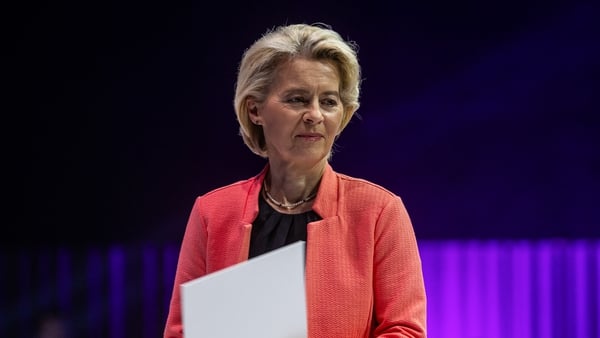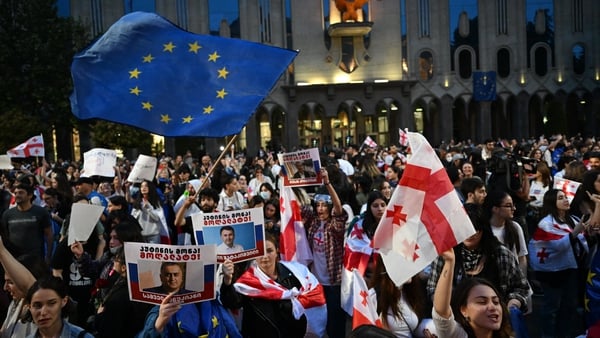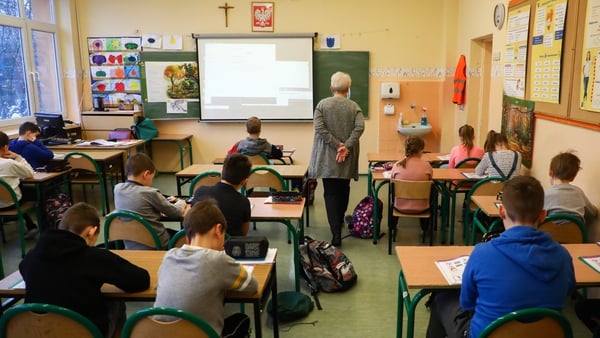This week marks 20 years since the European Union welcomed 10 new member states to the bloc, creating a much larger union.
Ireland held the Presidency of the EU at the time and hosted the 25 leaders of the newly enlarged EU at a ceremony at Áras an Uachtaráin.
Eight central and eastern European countries, whose economies lagged far behind those in western Europe, made up the bulk of the new members. A little more than 14 years previously, they had emerged from decades of Communist rule.
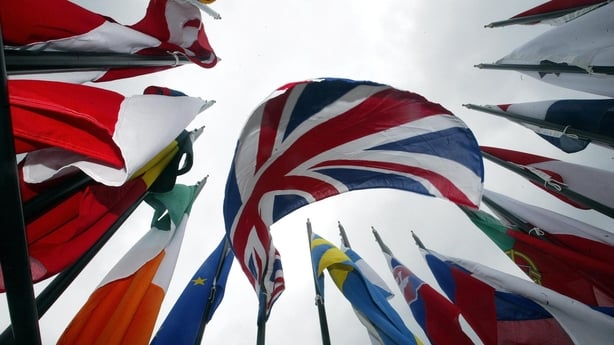
Income levels in Poland, the largest new member state, were less than 25% of the EU average.
The country’s unemployment rate was 19%.
Ireland, along with the UK and Sweden, had opened their job markets to the new arrivals and, in the weeks and months after accession, thousands of young people from the new eastern EU countries, arrived in Ireland seeking work.
Kasia Pastryk, then a 25-year-old food technology graduate from Warsaw, landed in Dublin in August that year.
"It was very difficult at the time to find a job in Poland, especially in my profession as a food technologist," Ms Pastryk told RTÉ News.
By chance, she met a friend from university on O’Connell Street who was working at Beshoff’s fish and chips shop. He told her there was a job going.
Read more: Eastern European countries continue wait for EU acceptance
"I did take the place of washing dishes and cleaning up tables and that was my first experience working in Ireland," said Ms Pastryk.
Within months, she had secured a new job as a food safety manager at a retailer, kickstarting a career in Ireland.
"I think my life in Ireland was really good. I do appreciate the freedom, the environment in Ireland, when you land, in one minute you feel that you are at home."
In the immediate years that followed Poland's accession to the EU, more than 150,000 Poles moved to Ireland.
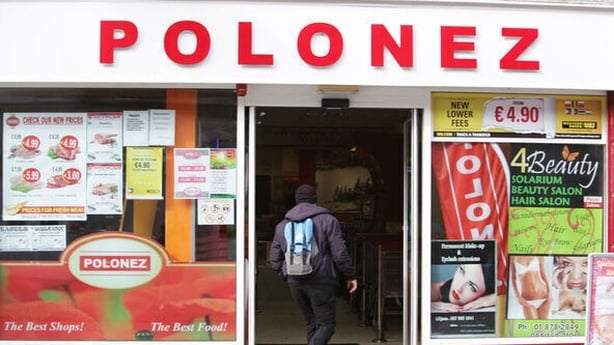
A majority settled, raising Irish-born children, many of whom identify as Irish-Polish today.
However, thousands of Polish citizens have also returned to live in Poland in recent years.
It is a decision that Ms Pastryk made in 2018, after 14 years living and working in Dublin.
"The biggest factor was the housing market. Unfortunately after so many years living in Ireland I thought I would never have a chance to buy an apartment. At some stage in your life you just need a place to live rather than renting," she said.
She found a job as a food technologist with a multinational company in Warsaw and bought an apartment in her home city.
"The Polish conditions of gaining a mortgage are not as stringent as in Ireland, and it was a lot easier, it was more affordable and you could choose where you wanted to live."
But her connection with Ireland continues.
A year after she returned to Poland, she began working for Bord Bia in Warsaw.
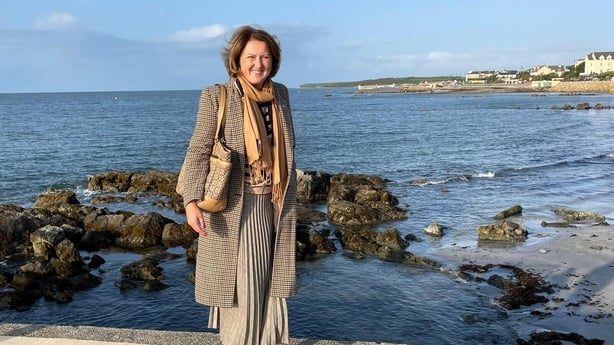
Ireland’s census data from 2022 show that just over 93,000 Polish citizens were resident in the State.
The same census recorded almost 124,000 Polish speakers in the State. This larger figure may take into account children born to a Polish parent who speak Polish at home, yet may have Irish or dual Irish-Polish citizenship.
However, the number of residents in Ireland who listed their nationality as Polish fell by almost 30,000 since the previous census in 2016.
The availability of more affordable housing and wage growth are two factors that are drawing people home.
"In the last 20 years alone, since the EU accession, Poland has doubled its GDP per capita," Marcin Piatkowski, a professor of economics at the Kozminski University in Warsaw, told RTÉ News.
"Post EU accession what really mattered is the open borders, is the free flow of trade, free flow of capital, it is just a textbook example of what countries need to grow," said Prof Piatkowski, who also authored the book 'Poland’s Economic Miracle’.
Average net incomes in Poland are still about 2.5 times smaller than the EU average according to Eurostat data.
Yet, looking at levels of actual individual consumption – a way of measuring the welfare of households based on purchasing power – Poland scores ahead of Greece, Portugal and Spain.
"What needs to happen going forward is that we want wages to continue to grow, but they need to grow because of higher productivity. And Poland still has plenty of space to absorb technologies and ways of doing things from the West," said Prof Piatkowski.
Poland’s growing economy is not the only factor that has encouraged some of its citizens to move home.
Family factors have also influenced decisions.
Marcin Piotrowski, a sociology graduate from south-eastern Poland, arrived in Ireland to work as night porter in a hotel in Ennis in June 2004.
"I was one of the first of that wave which came to Ireland in 2004 after our accession to the EU," said Mr Piotrowski, who returned to Ennis for seasonal work for the next three years.
He and his wife Marina moved to Ennis full-time in 2007 and worked in factories and shops.
Their three children were born in Ireland and have Irish citizenship.
But his intention, he said, was always to move back to Poland.
"I used to work as a supervisor in the factory but still I didn’t feel [Ireland], it’s fully my place," said Mr Piotrowski.
"Our life was very divided between two countries. We wasn’t fully in Ireland, we wasn’t fully in Poland. So for the kids it was complicated and as well for family life it wasn’t easy.
"So we said we’ll have to go back before they start the full educational system because it’s very difficult to take kids from one educational system to the other."
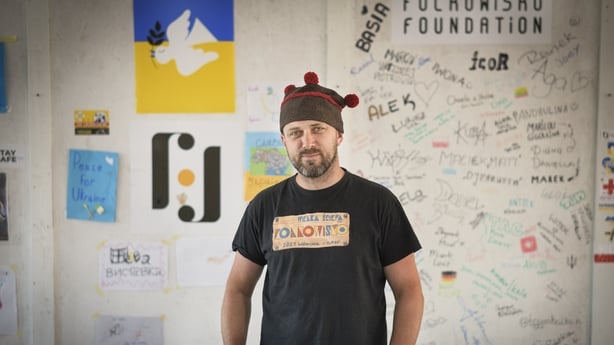
After 10 years in Ennis, the family moved back to Mr Piotrowski’s home village of Gorajec, 10km from the Ukrainian border and opened a bed and breakfast.
But Mr Piotrowski took his experiences of living in Ireland home with him.
He had become involved in local politics in Ennis, as "an observer", he said.
Two years after he returned home, he ran as an independent candidate in local elections and won a seat on his regional council.
Some of his political views jarred with older, conservative councilors.
"I was really something new but for many it was shocking what I had brought with me," he said.
Mr Piotrowski was the only councilor to vote against a proposal at council level to declare his region to be "free of LGBT ideology" in 2020, and he supported women’s rights marches when Poland’s Constitutional Tribunal placed a near-total ban on abortion in October 2020.
He then set up a cultural association called Folkowisto to celebrate shared Polish-Ukrainian culture and music in the border region, and another foundation which has helped Ukrainian refugees since the start of Russia’s full-scale invasion.
"When I was in Ireland, I learned how important traditional culture is and we decided to create in our village in Poland, a folk festival, like in Doolin, or a Fleadh."
Twenty years after accession, support for EU membership in Poland remains high at 77%.
But that is the lowest level in more than a decade, according to recent polling data this week from CBOS.
Poland's previous nationalist government had frequently clashed with the EU over the rule-of-law.
And country’s farmers are also at loggerheads with the EU over new farming rules.
Another notable change is the arrival of immigrants in Poland from non-EU countries on work visas.
And more than one million Ukrainian refugees arrived in the country following Russia's full-scale invasion in February 2022.
"Poland has gone from being a country of emigration, which was the case always since the 19th century, to a country of immigration," said Dr Dominika Pszczolkowska from Warsaw's Centre of Migration Research.
Dr Pszczolkowska, who has studied the involvement of Polish nationals in local Irish politics, said that "the experience that Polish people have abroad, living with other nationalities, are very valuable right now".


